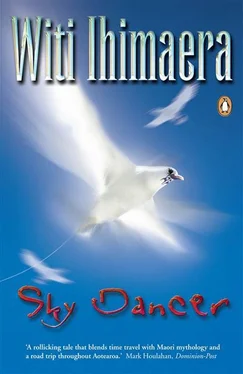“Our normal strategy,” Tui began, “has been to wait until our borders have been crossed before we retaliate. But I like the idea of a pre-emptive strike.”
“Ka tika,” Ruru hooted. “We have always maintained the defensive. Such a move, however, will take the battle onto the offensive.”
Chieftain Kuku of wood pigeons, who happened to overhear, and who never really had an opinion, added his voice to the considerations.
“He kuku ki te kainga,” Kotuku sighed, “he kaka ki te haere. A pigeon at home becomes a kaka abroad, loud in his opinions.”
“Thank you, my elders of the war council,” Arnie said. He turned and gave his instruction to Chieftain Kotare of kingfishers. “Take my command to the landbirds of the open skies, windhovers, harriers, eagles, hawks, swifts, ducks, godwits and curlews, that they are to advance to the front and await my order. All forest birds are to take up positions in a second line of defence to be activated only when the seabirds cross the border into Manu Valley. Make sure that the forest birds control their ardour. The windhovers must have a clear shot. The only way to win this battle is to maintain control and strategy. That’s how I was taught in the Army.”
“The Army?” Chieftain Kotare asked.
“Oh, it’s too difficult to explain,” Arnie answered.
“And where would you like us, oh Chieftain?” Skylark interrupted. She motioned to Te Arikinui Kotuku, Te Arikinui Huia and Te Arikinui Karuwai, all of whom were making their mock obeisances to the Council of War.
“We’re the third line defences, eh girls!” Kotuku said as she put on her battledress and armour.
“Um, thanks,” Arnie said, not knowing what else to say. Then he turned to Skylark. “Have a heart, eh? Don’t give me such a hard time. I’m trying to fight a war here, and —”
Suddenly Arnie saw something from the corner of his eye. He looked up, and his binocular vision caught a glimpse of a strange object.
“Oh my god,” he yelled. He grabbed Skylark and the three arikinui, and pulled them down to the ground.
Just in time. Hoki’s shotgun landed right in the spot where they had been standing.
“E hika!” Huia screamed “What’s that .”
“Keep down,” Arnie yelled. “There’s more incoming on the way.”
This time it was Karuwai who screamed as three more objects came sailing through the sky. For a moment afterwards there was silence. Skylark found herself beak to beak with Arnie and saw his brown and blue eyes staring into hers.
“You can let me up now,” she said to him, as Tui and Kahu came to their aid.
“Oh … sure …”
“We are definitely a crowd,” Kotuku said to the other three arikinui as they stood up. Skylark brushed herself down and stared at the objects that had almost brained her. Stuck in the marshy ground was a shotgun, rounds of ammunition, a pocketknife and a box of matches. As recognition dawned she began to hop about, giggling and jumping in the air.
“I just don’t believe it! Where did they come from?” she asked. She flipped onto her back, kicking her legs and chirruping with mirth.
As for Arnie, he was gobsmacked, totally speechless.
“You’ve had a special delivery,” Skylark giggled.
“Hoki must have heard me!” Arnie answered. He grabbed Skylark with joy.
“What’s all the fuss about?” Chieftain Kawau asked. The commotion had attracted the Council of War.
“We’ve just been sent a secret weapon,” Arnie said. “Those seabirds are in for the shock of their tiny feathered lives.”
Hoki’s gift had come just in time. As Arnie and Skylark were celebrating, a forward scout came whirring down to the ground.
“Sir, we were looking seaward when something strange occurred. A blanket made of white feathers has just lifted off the sea. What does it mean?”
“The manu moana are on their way,” Arnie said.
The seabird army lifted off. From the start Karuhiruhi and Kawanatanga became locked in a dangerous play for power. Much to Kawanatanga’s anger, Karuhiruhi ordered that he and his seabird reinforcements should bring up the rear.
“This is my fight, not yours,” Karuhiruhi said. “I will lead it with Karoro of black-backed gulls, Parara of prions and Taranui of terns.”
Karuhiruhi also wanted to teach his upstart descendant a lesson on who was the leader. It was a risky game, for Kawanatanga was clearly the stronger.
“That makes no sense, ancestor,” Kawanatanga said. “Already my seabirds, by virtue of their greater physical power, are overflying your own contingents.”
“Then keep them back, keep them back, I say,” Karuhiruhi thundered. “It is my prerogative to lead the army and for my lieutenants to avenge themselves for our defeat at the first battle of the birds.”
Kawanatanga gave a cynical laugh. “I will bide my time,” he said, under his breath. “From being your descendant, I have become your greatest opponent.”
Ah yes, uneasy lay the head that wore the crown.
Ignorant of Kawanatanga’s ambition, Karuhiruhi gave orders to Toroa. “Go ahead, my albatross friend, and be our eyes on the battle.” Then he turned to Karoro, Parara and Taranui. “Order all your gull battalions to the front.”
“Thank you, my lord,” Karoro answered. His clarion call was echoed by Taranui and Parara. “All black-backed gulls, all black-billed gulls, all red-billed gulls, come forward. Join us, our cousins, all black-fronted terns, Antarctic terns, white-fronted terns, sooty terns, white terns and all prions. We have been given the honour of leading the utu on the landbirds.”
Burning with suppressed fury, Kawanatanga wheeled away from Karuhiruhi and took up his position with his seabirds from the future.
“Have your day, old bird,” he said to himself. “Tomorrow it will be my turn.”
The arrival of Hoki’s special delivery caused a slight delay in Arnie’s departure to the front.
“Could you go on ahead to marshal the troops?” he asked Chieftain Tui and Chieftain Kahu. “I’ll be there as soon as I can.”
At the front, all the windhovers, the birds of the open sky, were waiting for the order to attack.
“Look!” Kahu said.
The seabird army was approaching, its frontline stretching from one side of the horizon to the other. The sight filled the manu whenua with dread.
“Their beaks are open,” said Tui, “as if they are already preying on shoals of fish!”
“We shall be overrun in the first attack!” said Chieftain Tere of swifts.
But Kahu gave them cause for hope. He noticed that as the seabirds approached, their frontline began to narrow down to a spearhead.
“They persist in their traditional strategy of a single, full-frontal attack on Manu Valley,” he pointed out.
“In that case,” Tui affirmed, “the balance of power may still be ours.”
He raised a wing for silence. His voice carried in the wind to the landbird army. “Let the seabirds know that we are not an opponent to be taken lightly.”
The landbirds set up a deafening clamour, a huge, formidable shrilling. The ruse had been Arnie’s suggestion, designed to confuse the seabird army into thinking there were more landbirds defending Manu Valley than expected. The rifleman iwi called zipt-zipt-zipt, a high-pitched challenge which jarred the air. The fernbird tribe called u-tick, u-tick. The paradise shelduck whanau set up a gutteral glink-glink, glink-glink. Overhead, the grey teal tribe had massed in a ferocious squad, adding to the din with their peculiar hoarse quack. Beside them, flanking to the left, the shoveler iwi made took-took noises.
The clamour also arose from the ground. The weka tribe called coo-eet, coo-eet. The marsh crake clan click-clicked. The kiwi whanau set up a shrill ear-splitting ki-wi, ki-wi. The bittern tribe began to boom, one of the most far-carrying of all bird sounds. They set up a competition with the kakapo clan. The kea whanau rattled, cackled, roared and yelled for all they were worth. Higher up the scale, the parakeet tribe screamed and screeched like banshees. The noise rose in a cacophony, a whirlwind wall of sound that went off the decibel range, a psychic fist punching into the approaching seabirds.
Читать дальше












